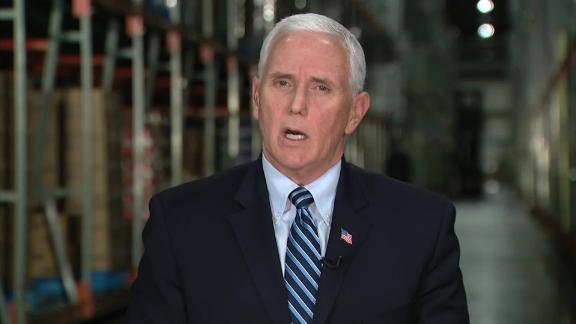Pence seeks to blame CDC and China for any delay in US coronavirus response — not Trump’s initial failure to face reality

Vice President Mike Pence sought to cast blame on the Centers for Disease Control and Prevention and China Wednesday when asked why the US was so late in understanding the enormity of the coronavirus pandemic.
“I will be very candid with you and say that in mid-January the CDC was still assessing that the risk of the coronavirus to the American people was low. The very first case, which was someone who had been in China — in late January around the 20th day of January,” Pence told CNN’s Wolf Blitzer.
Pence continued: “The reality is that we could’ve been better off if China had been more forthcoming.”
“The reality is that China’s been more transparent with respect to the coronavirus than certainly they were for other infectious diseases over the last 15 years,” he said. “But what appears evident now is long before the world learned in December, China was dealing with this, maybe as much as a month earlier than that.”
A White House coronavirus task force spokesman denied that Pence was casting blame on the CDC’s response efforts.
“The CDC has been a major contributor to the Task Force and the whole-of-government response to the coronavirus outbreak. Vice President Pence has never cast blame on the CDC or any agency involved in the response efforts, and that did not change today,” coronavirus task force spokesperson Devin O’Malley said in a statement to CNN.
US health officials from the CDC took active steps starting in January to prepare for the outbreak as information trickled out of China. Members of Trump’s Cabinet also got involved and started briefing lawmakers. While public health officials and medical experts raised the alarm, Trump downplayed their concerns and injected controversial and unproven theories into the conversation.
In the course of two months, President Donald Trump has dramatically shifted his tone and level of optimism about the spread of novel coronavirus and its impact on the economy.
At the coronavirus briefing on February 26, for example, Trump said all of the following: “This is a flu. This is like a flu”; “Now, you treat this like a flu”; “It’s a little like the regular flu that we have flu shots for. And we’ll essentially have a flu shot for this in a fairly quick manner.”
As recently as the second week of March, Trump was an advocate of facing the virus without taking drastic measures to address it.
Just four days ago, on March 27, he said that you can call the coronavirus “a flu,” or a virus or a germ.
On Tuesday, the President warned of a “painful” and “tough” two-week stretch ahead as he extended nationwide distancing measures that — even if followed closely — could still mean more than 100,000 and up to 240,000 Americans die from coronavirus.
Pence said Trump’s past statements that seemed to downplay the coronavirus outbreak were based in optimism and the vice president denied Trump had minimized the crisis early on, despite repeated statements casting the virus as a problem that would be easily solved.
“I don’t believe the President has ever belittled the threat of the coronavirus,” Pence said.
Given examples of the President doing just that — either by comparing it favorably to the flu or auto accidents or by saying cases would get to zero quickly — Pence said Trump was trying to maintain a rosy outlook.
“The President is an optimistic person,” Pence told Blitzer. “We’ve been from the very beginning, when the President suspended all travel from China and stood up the White House coronavirus task force in January, we have been hoping for the best but planning for the worst, and that’s been being worked out every single day. And what the American people can see in this President every day is a leader who knows that we will get through this.”
Pence also suggested that by continuing mitigation efforts to stop the spread of the virus, “we could well have the coronavirus largely behind us as a nation” by June.
“I never want to minimize the loss. I just want to make sure people know there is light at the end of the tunnel,” he added.
The vice president also said he doesn’t think a national stay-at-home order is necessary. He said the administration supports orders like those made in California and in Washington (state), but suggested that they’re not necessary across other parts of the country less affected by the coronavirus outbreak.
CNN’s Nikki Carvajal, Daniel Dale and Marshall Cohen contributed to this report.
